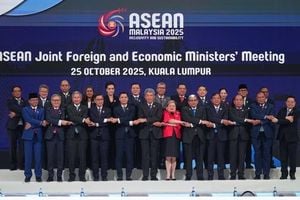Thailand, once revered as the world’s leading rice exporter, faces significant hurdles as it transitions through 2024. The rice industry, which serves as one of the kingdom's economic backbones, now grapples with issues ranging from rising competition from neighboring countries to changing weather patterns and potential disruptions from geopolitical tensions.
According to sources familiar with the sector, Thailand’s position has recently been challenged by its rivals, particularly Vietnam and India, who are aggressively increasing their rice production capacities. These countries have begun offering more competitive pricing, effectively undercutting Thai rice prices on the international market.
The Thai Rice Exporters Association reported exports have dwindled lately, dropped to 6.5 million tonnes last year from 7 million tonnes previously. This decline signifies more than just numeric fallout; it highlights the shifting dynamics within global rice trading. Experts warn this downward trend may persist if Thailand doesn't innovate or adapt its strategies rapidly.
Weather conditions play another pivotal role. The Thailand Meteorological Department indicated the possibility of El Niño effects, potentially leading to adverse impacts on rice yields. Commenting on this situation, agricultural expert Dr. Somchai Poonthong remarked, “The weather will be a key player. If we experience droughts during the planting season, it could critically reduce our already thinning stocks.” Enabling farmers to navigate potential adverse conditions has never been more pressing.
The economic repercussions of these challenges extend well beyond mere agricultural losses. The Thai economy, which heavily banks on agricultural exports, may see ripple effects, undermining growth forecasts for 2024. Government economists are pressured to bolster agricultural subsidies and support programs to shield farmers from market volatility and natural adversities.
Add to this the increasing geopolitical strife, where rising trade tensions globally, particularly from newly imposed tariffs from major importing countries, inhibit the rice export potential. The Thai government is exploring various diplomatic and commercial routes to secure favorable trade agreements, but progress remains slow.
Underpinning these economic factors are the logistical challenges: shipping delays and rising freight costs add more strain to exporters. For example, container shortages remain prevalent due to slower movement at major ports, impacting the efficiency and costs of rice shipments.
Marcus Chan, CEO of Chan & Sons Import-Export Co., emphasized the urgency of addressing logistical issues: “If we don’t find solutions to transport costs and shipment delays, we’ll continue losing market share.” His sentiments echo those of several stakeholders who fear losing rice's identity as Thailand’s hallmark product.
The Thai government, acknowledging these hurdles, is working tirelessly to find solutions, including investing $5 billion to modernize infrastructure and improve transportation networks connecting rural rice-growing areas to major export ports. This initiative, expected to be completed within the next two years, aims to optimize supply chains, thereby enhancing product availability and reducing costs.
The challenge also extends to maintaining rice quality, which has historically differentiated Thai rice from competitors. Many experts argue preserving this quality is key. Dr. Arnon Chatchavalvanich, renowned agricultural consultant, stated, “Thailand's premium jasmine rice has built its reputation on quality. We must not sacrifice this; it is our competitive edge.”
Potential diversification strategies are also on the table. The government and industry leaders are discussing avenues to produce value-added products derived from rice, such as rice flour and snacks, which could potentially meet the increasingly diverse preferences of global consumers.
These transformations, if executed well, could rejuvenate the Thai rice sector, allowing it to adapt within the shifting sands of global agriculture. Stakeholders across all levels remain cautiously optimistic. “If we strategize wisely, there's hope for us,” mentions a veteran rice trader who chose to remain anonymous.
While the adversities appear stark, the resolve of Thailand to reclaim and strengthen its rice sector remains unwavering. The 2024 outlook may be bleak, yet with proactive measures and innovative thinking, the nation's rice industry may yet navigate its way back to preeminence.



